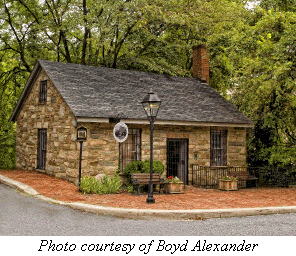top of page
Occoquan Historical Society
THE MILL HOUSE MUSEUM

413 Mill Street, Box 65
Occoquan, VA 22125
Open 11:00 a.m. to 4:00 p.m. (closed Wednesdays)
The Mill House Museum Collection
The History of the Mill House
Special Exhibits
Historic Photographs
Civil War Legacy Project
Memories of Occoquan
Mill House Museum Collection
The Mill House Museum Collection
The Mill House Museum contains an eclectic collection of documents, photographs, and other artifacts related to Occoquan's history and that of the surrounding region. Over 400 items are catalogued and many of these are on permanent display. One strength is the Society's collection of Occoquan-related photographs. While a number of these are on display in the Museum, many more have yet to be catalogued and made available to the general public. Of the catalogued items, roughly 20% are ceramics and textiles, 10% are scientific, medical, or technological items, 10% are household objects, 10% are library and archival documents, 10% are photographs, and the remainder fall into assorted miscellaneous categories.

The History of the Mill House
In the latter part of the 18th century, the Quaker Nathaniel Ellicott purchased what remained of the original iron works complex established by John Ballendine in the 1750s and converted it to milling operations. His main, or Merchants Mill, was advanced for the time, and may have been the first automated gristmill in the young United States of America. The main mill continued to be used in one fashion or another until 1924, when a generator fire in the Occoquan Electric Light and Power Company destroyed the main structure. Although the small attached Mill House, where the mill's administrator worked, remained unscathed, decades of subsequent neglect led to its near collapse. Eventually, the Alexandria Water Company purchased the Mill House in the middle of the 20th century when it began construction of the Occoquan dams. First restoring it for use as office space, the company's successor, the Fairfax Water Authority (now known as Fairfax Water) eventually turned the structure over to the Town of Occoquan, who leases it to the Occoquan Historical Society for use as a museum.
History of the Mill House


bottom of page